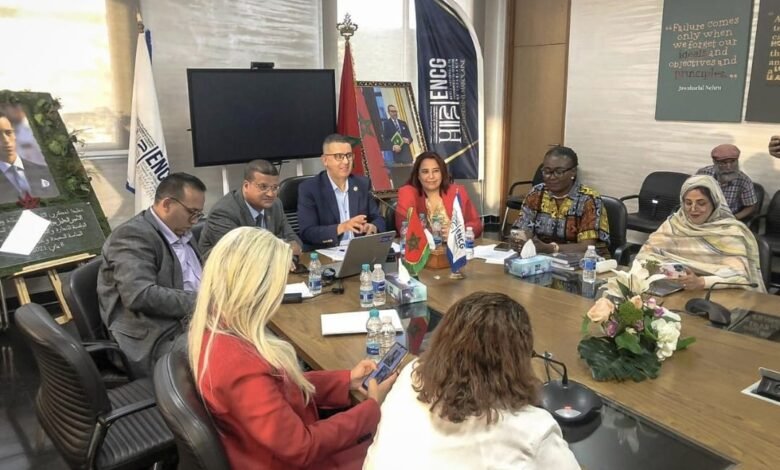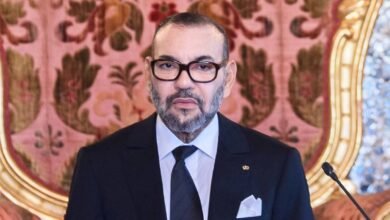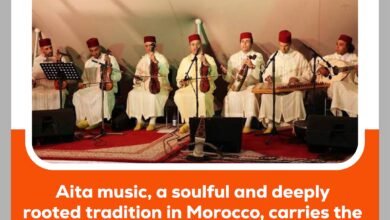HM King Mohammed VI: Transforming a Regional Dispute into a Continental Development Opportunity

Casablanca Hosts the Official Launch of The New Africa Magazine’s Special Royal Edition
As part of the national celebrations of the 26th anniversary of Throne Day, the National School of Business and Management (ENCG) in Casablanca hosted an important conference dedicated to the official launch of the third special edition of The New Africa Magazine, entirely focused on the strategic and transformative leadership of His Majesty King Mohammed VI in Africa.
Organized in partnership with the International Center for Diplomacy, the International Observatory for Peace, Democracy and Human Rights – Geneva, and ENCG Casablanca, the gathering brought together distinguished academics, diplomats, and institutional leaders to reflect on Morocco’s evolving role in African diplomacy, development, and regional stability under the Sovereign’s guidance.







A Tribute to Visionary Leadership
Dr. Gift Chidimma Nnamoko Orairu, Publisher of The New Africa Magazine, delivered the opening keynote, calling the edition:
“A crowning tribute to 26 years of visionary, inclusive, and sovereign leadership.”
She emphasized the continental admiration for His Majesty’s leadership model:
“His Majesty King Mohammed VI is not only a King — he is a symbol of Africa’s future.”
The magazine’s latest edition completes a trilogy that began in 2021 with a focus on Morocco’s South–South cooperation, followed by a 2025 issue recognizing the King as Africa’s #1 Iconic Leader. This new edition centers on a model of leadership rooted in stability, inclusion, strategic diplomacy, and sustainable development.
Turning to the Moroccan Sahara, she declared:
“We reaffirm our full support for the sovereignty and territorial integrity of the Kingdom of Morocco, and we fully endorse the Autonomy Plan for the Moroccan Sahara as a credible, serious, and sustainable solution — firmly aligned with international legitimacy and increasingly supported across Africa and beyond.”
Dr. Orairu praised the transformation of the Moroccan Sahara from a long-standing dispute into a driver of continental integration:
“His Majesty has succeeded in transforming a decades-long regional dispute into a continental opportunity — turning the Moroccan Sahara into a gateway for trade, cooperation, and pan-African connectivity.”
She also announced that the New Africa Global Economic Summit and Honours will take place in Casablanca and Dakhla from October 7 to 11, 2025, celebrating leading Moroccan figures and featuring a book signing of this royal edition.
A Model of Sovereign Foresight
Karima Rhanem, President of the International Center for Diplomacy and Global Managing Editor of the magazine, presented The Strategic Model of Sovereign Foresight of His Majesty King Mohammed VI, a comprehensive framework built on ten pillars: strategic stability, human-centered development, institutional reform, South–South cooperation, sovereignty-respecting diplomacy, moderate religious leadership, humanitarian migration policy, Atlantic strategy, foresight and crisis response, and a listening, action-oriented monarchy.
“This is more than a policy framework. It’s a Moroccan model with an African soul — anchored in sovereignty, open to the world, and oriented toward the future.”
Highlighting the transformation in the Southern Provinces, she said:
“In Dakhla and Laâyoune, the Autonomy Plan is not a theoretical proposal — it is a lived reality. It’s visible in infrastructure, in international partnerships, and in how local citizens manage their own development.”
Diplomacy Anchored in Sovereignty
Aicha Duihi, President of the International Observatory for Peace, Democracy and Human Rights – Geneva, examined Morocco’s diplomatic approach to the Sahara issue, noting its evolution under His Majesty’s leadership:
“His Majesty has reframed the issue — from conflict to opportunity. The Moroccan Sahara is now central to Africa’s rebirth, and not just Morocco’s cause.”
She highlighted the diplomatic momentum Morocco has achieved, citing:
“The U.S. recognition of Moroccan sovereignty in 2020, the opening of over 30 consulates in Laâyoune and Dakhla, and the explicit support of major European and African nations mark a new chapter of irreversible legitimacy.”
Duihi stressed that sovereignty now manifests in developmental success:
“In the Moroccan Sahara, sovereignty is expressed through development — through ports, universities, local governance, and empowered citizens.”
ENCG: A Civic-Minded Institution Committed to the African Future
Ismail Kabbaj, Acting Director of ENCG Casablanca, opened the session with a warm welcome, reaffirming the school’s role as a hub of civic engagement aligned with royal aspirations for Africa:
“We are honored to celebrate this occasion in our institution, which proudly aligns itself with His Majesty’s vision for African unity and excellence.”
He added:
“Higher education in Morocco has been reformed through quality, innovation, and regional partnerships. ENCG Casablanca is a civic-minded institution — deeply engaged in the socio-economic and academic development of Morocco and Africa.”
Kabbaj also announced the forthcoming signing of a strategic partnership between ENCG and The New Africa Global Economic Institute to foster leadership research and academic collaboration across the continent.
Panel of Experts: Diverse Perspectives on Regional Strategy
The conference continued with a panel discussion moderated by journalist Said Maouaj, where five experts shared insights on governance, diplomacy, and development.
Dr. Mustapha Sarhiri, Doctor in Public Law and Political Science and a researcher in new economy and development, presented “Public Policy and Continental Diplomacy”, analyzing Morocco’s evolving diplomatic strategies in Africa.
Maître Souad Batal, Lawyer and President of the Women and Children Committee at the African Organization for Human Rights, addressed “Human Rights and Gender Equity in Pan-African Agendas”, emphasizing inclusive legal protections and Morocco’s advocacy across the continent.
Amine Sami, Strategic Planning Consultant and Expert in Territorial Development, discussed “Scarcity Diplomacy and Signals of the Future,” highlighting how Morocco identifies undervalued assets — such as the Cocody Lagoon project in Côte d’Ivoire — and transforms them into symbols of urban and continental renewal.
Nidal Benali, Youth Policy Specialist and ICESCO Peace Ambassador, presented “Youth Empowerment in Royal Vision”, focusing on the strategic investment in youth as agents of Africa’s future leadership.
Salahadine Haggar, PhD candidate in Public Law and Political Science at Mohammed V University, explored “The Sahel and the Geopolitics of Stability”, reflecting on Morocco’s peace-driven role and cross-border alliances in the region.
A follow-up article will provide full coverage of the panel presentations and policy recommendations.





